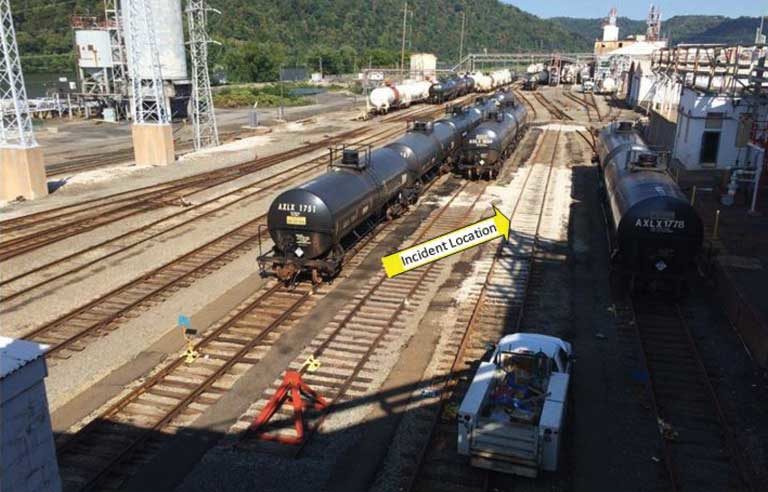NTSB issues five recommendations in report on West Virginia rail tank car incident

Washington — The Pipeline and Hazardous Materials Safety Administration’s “failure to establish a final tank car specification for poison/toxic inhalation hazard tank cars and an aggressive schedule for removing nonconforming tank cars from service” jeopardizes safety among fleets, the National Transportation Safety Board concluded in its investigation of a chlorine release from a ruptured rail tank car in West Virginia.
In a final report issued Feb. 14, NTSB states that a 42-inch crack developed on the tank shell of a Department of Transportation Specification-105 rail tank car after it was loaded with 178,400 pounds of liquefied compressed chlorine on Aug. 27, 2016, at the Axiall Corp.’s Natrium plant. As a result, the entire load spilled out over two-and-a-half hours and formed a vapor cloud that migrated south along the Ohio River valley near New Martinsville. Eight people were injured.
In the report, NTSB issued five recommendations, including three calling on PHMSA to:
- Promulgate a final standard that includes enhanced fracture toughness requirements for tank heads and shells for pressure tank cars used to transport poison/toxic inhalation hazard materials.
- Prohibit use of tank cars transporting poison/toxic inhalation hazard materials that are constructed of non-normalized steels and are not constructed of steels meeting the highest available fracture toughness specifications.
- Issue maintenance guidance for owners of DOT-105 pressure tank cars transporting poison/toxic inhalation hazard materials to establish structural integrity inspection frequency; critical flaw size, repair and acceptance criteria for indications in fracture-sensitive locations; and nondestructive testing methods to detect and identify cracks.
To the Association of American Railroads:
- Ensure local post-weld heat treatment processes are sufficiently monitored to avoid damage to tank car materials from uncontrolled heat treatment after welding and repairs.
To the American Railcar Industries Inc.:
- Develop inspection and maintenance procedures to address cracks in cradle pad weld attachments applicable to pressure tank cars equipped with ACF-200 stub sill underframes.
Post a comment to this article
Safety+Health welcomes comments that promote respectful dialogue. Please stay on topic. Comments that contain personal attacks, profanity or abusive language – or those aggressively promoting products or services – will be removed. We reserve the right to determine which comments violate our comment policy. (Anonymous comments are welcome; merely skip the “name” field in the comment box. An email address is required but will not be included with your comment.)

